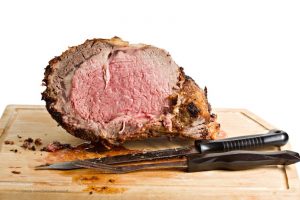Starting tomorrow, June 4, beef producers will be required to test beef trim, a major component of ground beef, for six additional strains of E.coli, as new regulations aimed at reducing foodborne illness take effect.
 Up until now, E.coli O157:H7 was the only strain of E.coli legally considered to be an adulterant, meaning it is illegal to sell beef contaminated with the strain but legal to sell beef contaminated with other strains, until someone gets sick. E.coli O157:H7 was declared an adulterant in 1994, following the Jack in the Box E.coli outbreak that sickened hundreds of people and killed four including a young boy.
Up until now, E.coli O157:H7 was the only strain of E.coli legally considered to be an adulterant, meaning it is illegal to sell beef contaminated with the strain but legal to sell beef contaminated with other strains, until someone gets sick. E.coli O157:H7 was declared an adulterant in 1994, following the Jack in the Box E.coli outbreak that sickened hundreds of people and killed four including a young boy.
But E.coli O157:H7 is not the only strain of the bacteria that can cause serious illness or death. The U.S. Department of Agriculture’s (USDA) Food Safety and Inspection Service (FSIS) estimates that banning the six additional strains of E.coli will reduce by 110,000 the number of foodborne illnesses reported in the U.S. each year.
The USDA had initially planned to implement testing of six strains, sometimes called “The Big Six,” in March, but producers asked for an extension to prepare for the new regulations. As of June 4, E.coli 0157:H7 and following six strains will be considered adulterants:
- E. coli O26
- E. coli O45
- E.coli O103
- E.coli O111
- E.coli O121
- E.coli O145
Any beef trim testing positive for these pathogens will not be allowed into commerce and will be subject to recall.
“These strains of E. coli are an emerging threat to human health and the steps we are taking today are entirely focused on preventing Americans from suffering foodborne illnesses,” said Agriculture Secretary Tom Vilsack, in a statement. “We cannot ignore the evidence that these pathogens are a threat in our nation’s food supply.”




